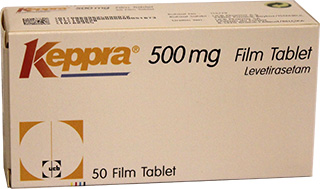Keppra Medication Overview
Keppra, with the generic name levetiracetam, is an antiepileptic medication used to treat seizures in people with epilepsy. It is available as an oral tablet, oral solution, and as an injectable form to be used when oral administration is not feasible.
Indications and Usage
Keppra is indicated for the treatment of partial-onset seizures, myoclonic seizures in people with juvenile myoclonic epilepsy, and primary generalized tonic-clonic seizures in individuals aged 6 years and older. It can be used as a monotherapy or adjunctive therapy.
Dosage Forms and Strengths
Oral tablets come in strengths of 250 mg, 500 mg, 750 mg, and 1000 mg. The oral solution is available in a concentration of 100 mg/mL. Keppra injection is provided in 500 mg/5 mL (100 mg/mL) single-use vials.
Dose Administration and Adjustment
Initial dosing typically starts at 500 mg twice daily for adults, which may be adjusted based on clinical response and tolerability. Adjustments can be made in 500 mg increments every 2-4 weeks. The oral solution can be used for patients who require a dose not available in tablet form or those with difficulty swallowing pill.
Mechanism of Action
The exact mechanism by which levetiracetam exerts its antiepileptic effect is unknown, but it is believed to involve the inhibition of certain voltage-gated calcium channels and modulation of GABAergic and glutamatergic neurotransmission.
Pharmacokinetics and Metabolism
Levetiracetam is rapidly absorbed after oral administration, with peak plasma concentrations occurring within 1 hour. It has a bioavailability of nearly 100% and is not subject to extensive metabolic transformation. Only a small fraction (24%) is metabolized, and the drug is predominantly excreted unchanged through the kidneys.
Drug Interactions
Keppra has no known significant drug-drug interactions, however, it should be used cautiously with other central nervous system depressants. Levetiracetam does not induce or inhibit cytochrome P450 isoenzymes.
Special Populations Considerations
Dose adjustment is recommended for patients with renal impairment. In elderly patients, the clearance of levetiracetam might be reduced due to age-related decline in renal function. For pregnant women, Keppra should be used only if the potential benefit justifies the potential risk to the fetus.
Administration Instructions
Keppra tablets should be swallowed whole with a sufficient quantity of liquid and can be taken with or without food. The oral solution should be measured with a provided dosing syringe and can be mixed with a glass of water before administration if desired.
Monitoring for Therapeutic Effect
Patients taking Keppra should have their seizure frequency monitored regularly to assess the medication’s effectiveness. Adjustments to the dosing regimen may be required based on clinical response.
Potential Adverse Reactions
Common adverse reactions can include somnolence, asthenia, infection, and dizziness. Behavioral abnormalities such as aggression and irritability have also been reported. Immediate medical attention should be sought if a patient experiences a severe skin reaction or symptoms of anaphylaxis.
Overdosage Management
In case of suspected overdose, symptomatic treatment should be initiated. Hemodialysis may be considered as keppra is dialyzable. Maintain adequate hydration and monitor renal function and vital signs.
Storage and Handling Instructions
Keppra tablets and oral solution should be stored at room temperature away from direct light and moisture. The injectable form should be refrigerated and protected from light. Any medication remaining after the course of treatment should be disposed of in accordance with local regulations.
Missed Dose Instructions
If a dose is missed, patients should take it as soon as they remember unless it is almost time for the next dose. In such cases, they should skip the missed dose and resume their usual dosing schedule. Double dosing to make up for a missed dose is not recommended.







Reviews
There are no reviews yet.